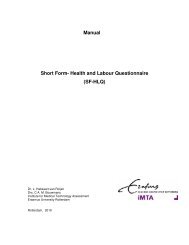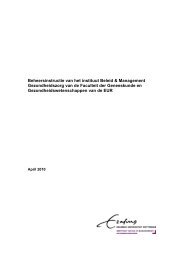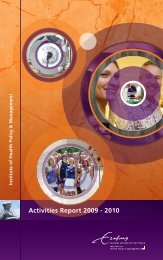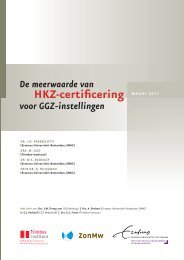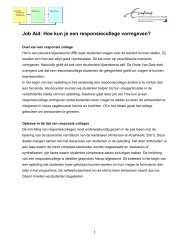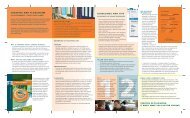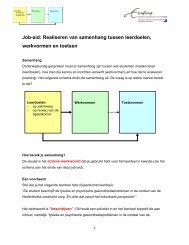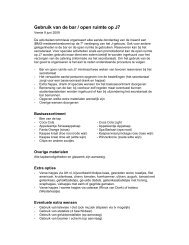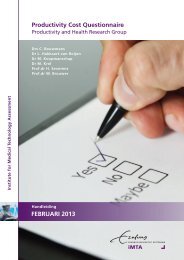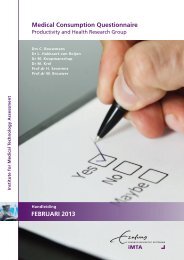Marten J. Poley - Erasmus Universiteit Rotterdam
Marten J. Poley - Erasmus Universiteit Rotterdam
Marten J. Poley - Erasmus Universiteit Rotterdam
- No tags were found...
Create successful ePaper yourself
Turn your PDF publications into a flip-book with our unique Google optimized e-Paper software.
Informal Care for Children Born with Major Congenital Anomalies 896.1 INTRODUCTIONMajor congenital anomalies are diagnosed in approximately 2% of all births. 1Children with these anomalies represent a special diagnostic and managementchallenge. They are treated in highly specialized centers, continuing long beyondchildhood. So-called informal care—which has been defined as that care which isprovided to disabled people by relatives and friends who are not paid for the helpthey provide 2 —supposedly constitutes a relatively large proportion of total care,as is also the case for a variety of other diseases. 3-5 Parents of children born withmajor anomalies play an invaluable role in the care, during the time that theirchild is hospitalized and far beyond.Informal caregiving has obvious positive effects. Informal caregivers are often themajor resource that prevents many chronically ill children from being admitted toan institution, saving the formal health care system billions of dollars annually.Parental caregiving represents a substantial economic value to society, as forexample Heyman and colleagues recently documented regarding children withchronic conditions. 6 Moreover, for many families, caring for their child isrewarding. Yet, it can also place heavy demands upon parents. Caregiving mayinvolve many diverse tasks, some of which are perceived burdensome,unpleasant or have to be performed at night-time, such as suctioning oftracheostomies and home parenteral nutrition. It may range from performingcaregiving tasks a couple of hours a week to practically provision of 24 hourpersonal care, seven days a week. Very little has been written about the effects ofcaregiving on the parents of children born with major congenital anomalies.It is all the more important not to disregard the position of informal caregiversgiven that demand for informal care is expected to rise in the future, while at thesame time the possibilities for meeting this demand decrease. On the one hand,from acute diseases with a prompt outcome, many major congenital anomalieshave increasingly become diseases with long-term morbidity and a continuingneed for care. 7 Moreover, current trends toward early hospital discharge andoutpatient treatment will contribute to greater dependence on informalcaregivers, because the time spent caring for a child at home is likely to exceedthe time spent caring for a child in residential care. On the other hand, theincrease in female employment and the increasing numbers of single-parentfamilies 8,9 will mean that there are less carers available and governments will notbe able to rely on them so heavily in the future.In view of these observations, it is essential to gain better insights into informalcare provided by the parents (or: 'informal caregivers') of patients with majorcongenital anomalies. The current study includes parents of children born witheither congenital anorectal malformations (ARM) or congenital diaphragmatichernia (CDH). The former are complex anomalies with a high incidence ofassociated urological problems, but the malformations are not life-threatening as



